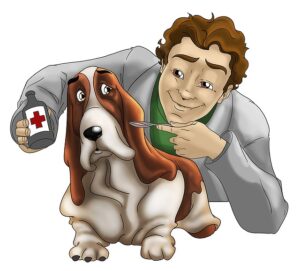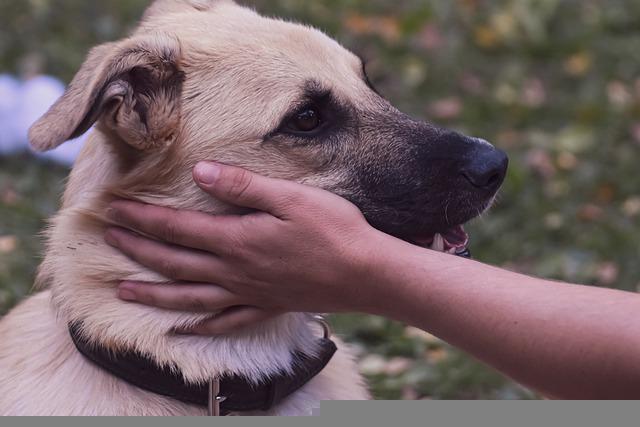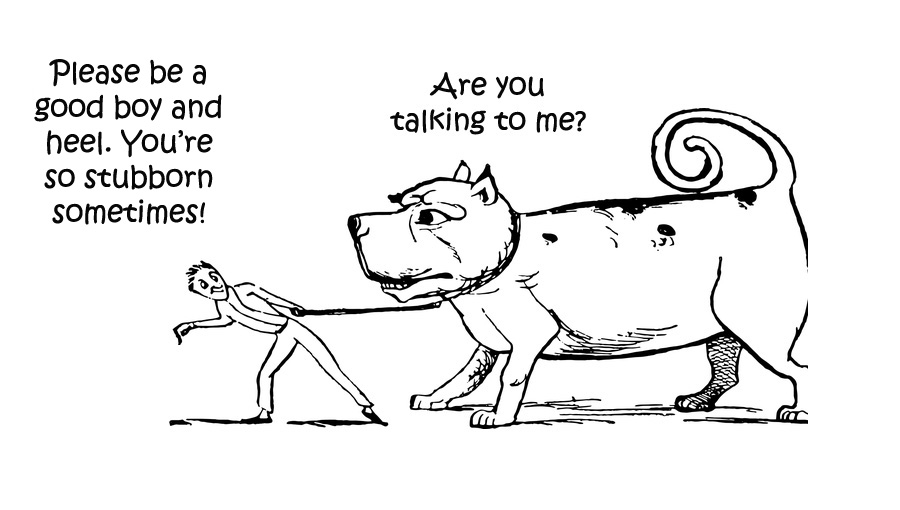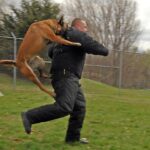Dog lovers have a common habit of being their dog’s ventriloquist. Though we don’t always need the pet parent to provide a descriptive narrative, we can see the bubble of words over the dog’s head. So why, when our dogs need us the most, to protect and defend them, and to speak up for them when they cannot protect themselves, do we dummy up and become compliant?
You may agree or disagree with many of the occurrences I will share with you as examples of human submissive behavior when involving the family dog. However, I hope that my words will surface in your mind when a particularly uncomfortable or questionable scenario arises. Furthermore, I’m counting on the fact that I can make you more aware of unpredictable situations that you may never expect to have unforeseeable results.
Before I bring to light some of my own experiences as well as stories passed on to me by my clients, I’d like you to consider this. Only a human will make an informed decision to ignore their instincts. Why? According to my research, we ignore our instincts due to self-image, or how we will be perceived by others. Entering into an uncomfortable or even possibly threatening situation may be preferred to feeling embarrassed or facing confrontation. Your dog’s welfare is more important!
Case 1. We take our puppy or adult dog to a large home improvement center. The purpose of this exercise is to introduce our dog to “the shopping experience” where there are a lot of people, maybe a few dogs, an array of loud sounds, and semi-organized hustle and bustle. When done properly with the guidance of a professional trainer, this shopping experience will succeed in teaching our puppy to be correctly socialized, developing improved self-esteem, and acquiring the social skills to NOT jump or bark at people passing by.
 Whether our dog is small, cute and cuddly or large, lumbering and intimidating, strangers will rush forward arms extended to touch a dog. Sometimes another dog is accompanying the stranger. Sometimes small children with or without an adult guardian will approach unexpectedly. A stranger may or most times may not ask permission to pet our puppy. They can’t resist. They just can’t help themselves. They love dogs…all dogs…our dog!
Whether our dog is small, cute and cuddly or large, lumbering and intimidating, strangers will rush forward arms extended to touch a dog. Sometimes another dog is accompanying the stranger. Sometimes small children with or without an adult guardian will approach unexpectedly. A stranger may or most times may not ask permission to pet our puppy. They can’t resist. They just can’t help themselves. They love dogs…all dogs…our dog!
 Do we really want everyone and anyone, human or canine approaching our dog? Do we really know if another dog will bite our dog? Do we really know if a person or child will frighten our dog and our dog will have a fight or flight reaction and snap? I always prefer to avoid a bad situation if I don’t know for sure what the outcome will be. So why do we remain silent? Why can’t we express our desire for our puppy to not be touched?
Do we really want everyone and anyone, human or canine approaching our dog? Do we really know if another dog will bite our dog? Do we really know if a person or child will frighten our dog and our dog will have a fight or flight reaction and snap? I always prefer to avoid a bad situation if I don’t know for sure what the outcome will be. So why do we remain silent? Why can’t we express our desire for our puppy to not be touched?
If you are at a loss for words, I’ll make it simple for you. Just say “My dog is in training”. “He can’t be played with right now.”
 Case 2. We take our dog to the vet’s office. We love our vet and trust him. A person, probably a vet tech comes into the exam room and states that they are taking your dog to be weighed. While your dog is out of the room, someone may give him vaccines, do blood work, take his temperature, and express his anal glands, just to mention a few procedures. Some of these procedures you may not be aware of until after your dog is returned to you.
Case 2. We take our dog to the vet’s office. We love our vet and trust him. A person, probably a vet tech comes into the exam room and states that they are taking your dog to be weighed. While your dog is out of the room, someone may give him vaccines, do blood work, take his temperature, and express his anal glands, just to mention a few procedures. Some of these procedures you may not be aware of until after your dog is returned to you.
So, it is absolutely OK to say, “I don’t want my dog taken out of the room where I can’t see what is going on”. It’s also absolutely OK to say, “I don’t want my puppy to have more than one vaccine today and will come back another time for the rest”. It’s OK to ask what is being done or administered to your puppy and why. You need to be your dog’s advocate and find out about all the meds you are told to give him. Find out what the pros and cons are concerning the recommended pesticides used to prevent heartworms, fleas, ticks, and other worms/parasites. Ask what happens if your dog has an adverse reaction to a 6-month or 12-month injectable dose of a heartworm preventive.

Case 3. The GROOMER. It’s not easy to find a groomer that you and your dog like. It’s even difficult to get an appointment with short notice. But it’s still OK to tell the groomer that you don’t want your dog’s “private areas” shaved too closely. If your dog shows signs of tucking down as though to sit but doesn’t, and constantly licking private areas, it is due to razor burn or shaving too closely. Your groomer may also express your dog’s anal sacs and your dog can come home feeling uncomfortable if not done correctly. Take the time to talk to your groomer about any concerns you have.
 Your dog doesn’t need to be in contact with every dog encountered on a walk or in the park or on a trail. Not all dogs are friendly even if the pet parent claims that their dog has never bitten anyone! Biting is a knee-jerk reaction and is not predictable.
Your dog doesn’t need to be in contact with every dog encountered on a walk or in the park or on a trail. Not all dogs are friendly even if the pet parent claims that their dog has never bitten anyone! Biting is a knee-jerk reaction and is not predictable.
Remember this… A dog doesn’t bite until the moment he does!
 Even the sweetest of dogs may be reactive without any noticeable provocation. Not every dog has social grace; meaning your dog might be injured simply by another dog trying to be dominant.
Even the sweetest of dogs may be reactive without any noticeable provocation. Not every dog has social grace; meaning your dog might be injured simply by another dog trying to be dominant.
Dominance can come in the form of biting but also by the dominant dog standing with front paws on the back of the submissive dog.
BE YOUR DOG’S ADVOCATE! Protect your dog by being his voice.











